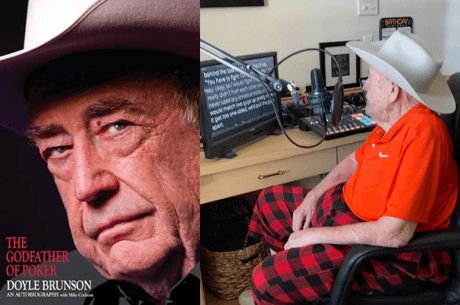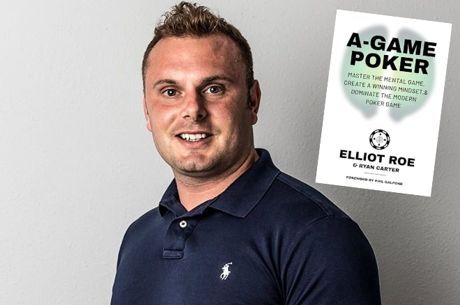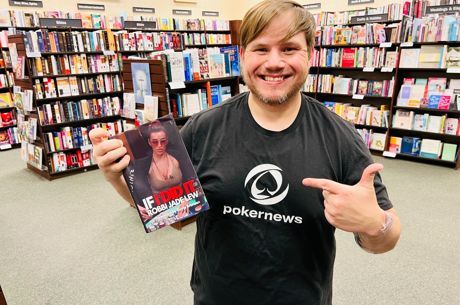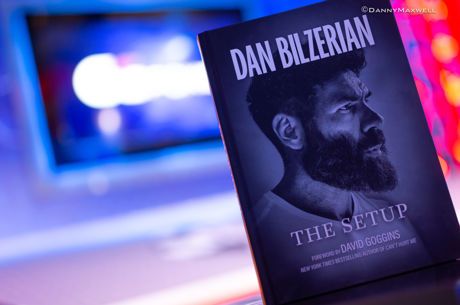PokerNews Book Review: "The Myth of Poker Talent" by Alexander Fitzgerald

Does talent make a successful poker player? In his new book The Myth of Poker Talent: Why Anyone Can Be a Great Poker Player, Alex Fitzgerald argues that practice, not talent, matters most. He also makes the case for a disciplined, gritty approach to the game.
"If you want to learn something you must fail, fail constantly," said Fitzgerald. "You have to identify what you do not know, as opposed to acting as if you already have all the winning components. You have to work very, very hard."
Fitzgerald, a successful poker pro, coach and writer, rose through the online ranks during the mid-2000s. He spent the next few years traveling the world, backing dozens of players and renting mansions with private beaches. Suddenly he went broke. What went wrong? Identifying mistakes that included poor bankroll management, bad backing deals and "a horrible mentality," Fitzgerald rededicated himself to poker and pursued a healthier lifestyle.
This book shares his findings during that journey. Blending rigorous strategy discussion with autobiography, philosophy and good humor, The Myth of Poker Talent may remind readers of Barry Greenstein's Ace on the River.
Many poker players have a religion: The Church of the Latest Results...Whoever is crushing it is right. Everyone else is wrong.
"Many poker players have a religion: The Church of the Latest Results," Fitzgerald writes. "Whoever is crushing it is right. Everyone else is wrong."
Questioning conventional wisdom, Fitzgerald often examines population tendencies that, like denim jackets or Chuck Taylors, fall in and out of fashion.
Take preflop raise sizing, for instance. In the 1990s, the traditional preflop raise was to the size of the pot, or to about 3.5 times the big blind. In the early 2000s, online tournament players raised a tad smaller, about three big blinds. This tendency had two effects: (1) players rarely flat-called out of position, since calling three big blinds and folding the flop virtually guaranteed a net loss; and (2) the all-in re-steal became an effective method of battling larger-sized preflop raises.
In the mid-2000s, a handful of online players began min-raising when they entered pots (i.e., raising just 2 BBs). They were often mocked by opponents who, failing to consider why this strategy might be useful, dismissed smaller sizing as foolish. But these prescient min-raisers knew that their tiny raises seldom needed to work to be profitable.
Pop quiz: If you min-raise on the button, how often must the blinds fold in order for your play to break even?
The answer, as Fitzgerald explains through basic math, is 45 percent of the time. Think about this for a moment. Your opponent could shove all in 54 percent of the time — a majority of the time — and your minraise would still work with Snickers wrappers in place of playing cards.
As you might be guessing, Fitzgerald is a numbers guy. He wants to understand how math and statistics affect every single decision at the poker table. To assist to readers in this process, the book makes use of a number of online tools, including Flopzilla, CardrunnersEV, ICMizer, Note Caddy, Holdem Manager 2 and, most importantly, an old-fashioned calculator.
Here's another common scenario: Action folds to you on the button with Ax2x offsuit and you have 17 big blinds. Is it better to open-shove or raise-fold?
For years, the poker community, Fitzgerald included, refused to believe that raise-folding a 20 big-blind stack was profitable. But CardRunnersEV shows that the expected value of the two options are nearly identical.

"Better yet," Fitzgerald said of raise-folding, "we did not risk that many chips in order to achieve the same result. Going from 17 big blinds to 15 big blinds is much less devastating than going from 17 big blinds to zero big blinds."
Knowing the math behind these short-stacked spots, which comes repeatedly in tournaments and Sit & Go formats, is crucial. In a memorable example from this year's WSOP Main Event, action folded to Johnny Chan on the button with about 20 big blinds. He open-shoved with 8♠5♣ and busted when the big blind called with pocket tens. If Chan had raise-folded (or open-folded) — then who knows? — we might be watching him this weekend on ESPN's coverage of the "November Nine."
Fitzgerald's book works cumulatively, building off early sections that are both philosophical, "What Poker Is," and technical, "Jamming and Re-Jamming Ranges." These foundational discussions lead to more advanced topics like three-betting and four-betting, continuation betting, check-raising, donk betting, triple barrel bluffing and postflop play.
Whatever you think of Fitzgerald's non-poker musings — he mentions everything from gun control to educational psychology to battle rap — the strategy content is worth the price of admission. For readers unfamiliar with the language of HUDs, VPIP statistics and folding percentages, Fitzgerald defines these terms alongside helpful graphics. Nevertheless, the book is a demanding read.
Drawing from his decade-long experience as a professional, Fitzgerald concludes by addressing "the poker lifestyle." Success in poker, especially in 2016, requires a healthy mindset and a relentless work ethic.
"The minimum requirements to be effective when playing poker for a living are to currency leverage, be a merciless nit with your bankroll, outwork everyone and study as if you are going for your doctorate," Fitzgerald said. "You need to do this every single day."
At 327 pages, The Myth of Poker Talent is a comprehensive guide to both playing poker and being a poker player. While online MTT players may benefit the most from Fitzgerald's insights, the book is applicable to all variants of no-limit hold'em (tournaments or cash games), live or online. Just be ready to put in the effort.
For full details on the book and how to order it, visit .
Ben Saxton is a teacher and a writer from upstate New York who has played small-stakes poker, both live and online, since the early 2000s. Ben lives in New Orleans and covers poker on the Gulf Coast.









